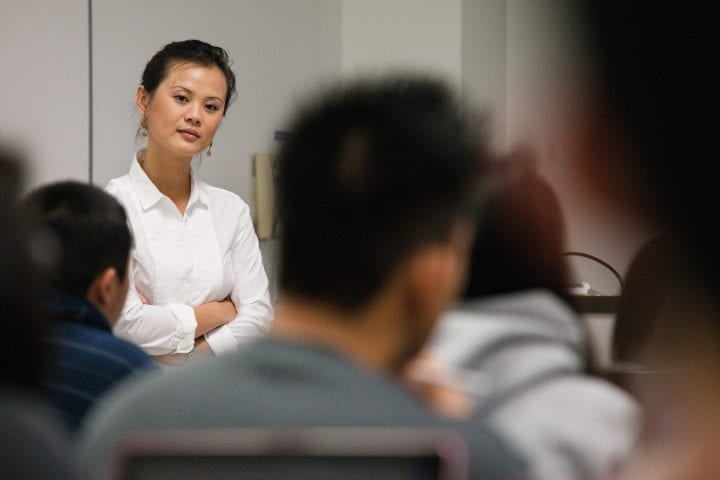Making history
Student interviewers record the life stories of Vietnamese American immigrants for archival preservation.

Emeline Nguyen recently learned some surprising details about her stepmother’s journey to the United States from Vietnam in 1975.
The price of her passage across the South China Sea was 2 ounces of gold. Pirates seized the small fishing boat crammed with 100 people and took passengers’ jewelry and other belongings.
When the vessel arrived in Thailand, the teen – who was traveling alone – was placed in a refugee camp, where she languished for a month before heading to Northern
California, sponsored by a local church.
“I can’t imagine being in a refugee’s shoes,” Nguyen says, “starting your life over in a strange land and learning a new language and culture.”
A UC Irvine senior majoring in sociology and history, she’s enrolled in “The Vietnamese American Experience,” a course offered through the Department of Asian American Studies. Those taking the class contribute to a School of Humanities project to assemble and preserve the oral histories of Vietnamese Americans in Southern California.
The Vietnamese American Oral History Project will be housed at the UCI Libraries’ renowned Southeast Asian Archive and will be made available to researchers and the public upon its completion in three years.
Established in 1987, the archive includes items that range from paintings by artists in refugee camps to business directories for Orange County’s Little Saigon. Researchers from around the world have visited UCI to access the archive, the only one of its kind that continues to trace the community’s growth in the U.S. since the end of the Vietnam War.
Students like Nguyen are trained in oral history theory and methods. Each must conduct and record one full oral history interview with a subject who is Vietnamese American, at least 30 years old and a resident of Southern California.
The oral history project has special significance for Vietnamese American students, says Linda Vo, associate professor of Asian American studies, as it gives them a deeper understanding of the challenges their parents faced leaving their homeland.
“Not only do they gain invaluable research skills conducting oral histories, but their interviews will be preserved forever as part of a larger collection that can be shared with future generations,” Vo says. “Rarely is a student’s class assignment saved in a publicly accessible digital archive.”
Growing up in Pasadena and Tustin, Nguyen didn’t ask her parents too many questions about their journey to the U.S. or life in Southeast Asia. “I wasn’t interested in learning about my culture,” she says.
The 2009 death of her father – who had remarried – changed that. “Since my father passed away, I’ve decided it’s time to explore my background,” Nguyen says. “I’ve already taken courses covering Korean, Jewish and Mexican American experiences in the United States. I can’t escape my own roots.”
She spent about three hours interviewing her stepmother, armed with an iPhone and a profound sense of curiosity. She discovered that an employment assistance program for Vietnamese refugees had helped her stepmother get her first job as a cake decorator in Sacramento. Because her stepmother’s parents and siblings had settled in Canada and France, cousins and fellow refugees provided support.
Postdoctoral fellow Thuy Vo Dang was hired by the School of Humanities to lead the Vietnamese American Oral History Project, which is funded by a generous, anonymous donation. She will teach the course once a year for the next three years.
Students are required to turn in a packet that includes an audio recording of their interview, a transcript in the language the interview was conducted, an abstract summary and three photos of the interview subject.
At the beginning of the class, Vo Dang reviews Vietnam’s turbulent history with her students, covering French colonialism, the Vietnam War and the mass migration of exiles in 1975. In the years after that, more than a million refugees fled the war-ravaged countries of Vietnam, Cambodia and Laos.
“I want students to connect personal stories with larger historical forces,” Vo Dang says. “I hope that by the end of the quarter, students see themselves as oral historians.”
She notes that about 1.5 million Vietnamese Americans live in the United States – transforming the landscape in places such as Orange County, where the cities of Garden Grove and Westminster boast vibrant Vietnamese business districts.
Their experience has no place in Vietnam’s official narrative of the war, she says, and the U.S. account focuses on American lives lost. The project allows refugees to tell their stories on the record.
“I hope this collection provides a more nuanced portrait of Vietnamese Americans,” Vo Dang says. “These are tales of ordinary people and their struggles, not one heroic individual.”